A QA Lead plays a crucial role in ensuring the quality and reliability of software products. They oversee the testing process, manage a team of testers, and ensure that all product issues are addressed prior to release.
Skills required for a QA Lead include a strong understanding of software testing methodologies, leadership abilities, and effective communication skills. Additionally, they must be adept at problem-solving and organizing.
Candidates can write these abilities in their resumes, but you can’t verify them without on-the-job QA Lead skill tests.
In this post, we will explore 7 essential QA Lead skills, 8 secondary skills and how to assess them so you can make informed hiring decisions.
Table of contents
7 fundamental QA Lead skills and traits
The best skills for QA Leads include Test Automation, Bug Tracking, Performance Testing, Security Testing, Risk Management, Test Plan Development and API Testing.
Let’s dive into the details by examining the 7 essential skills of a QA Lead.
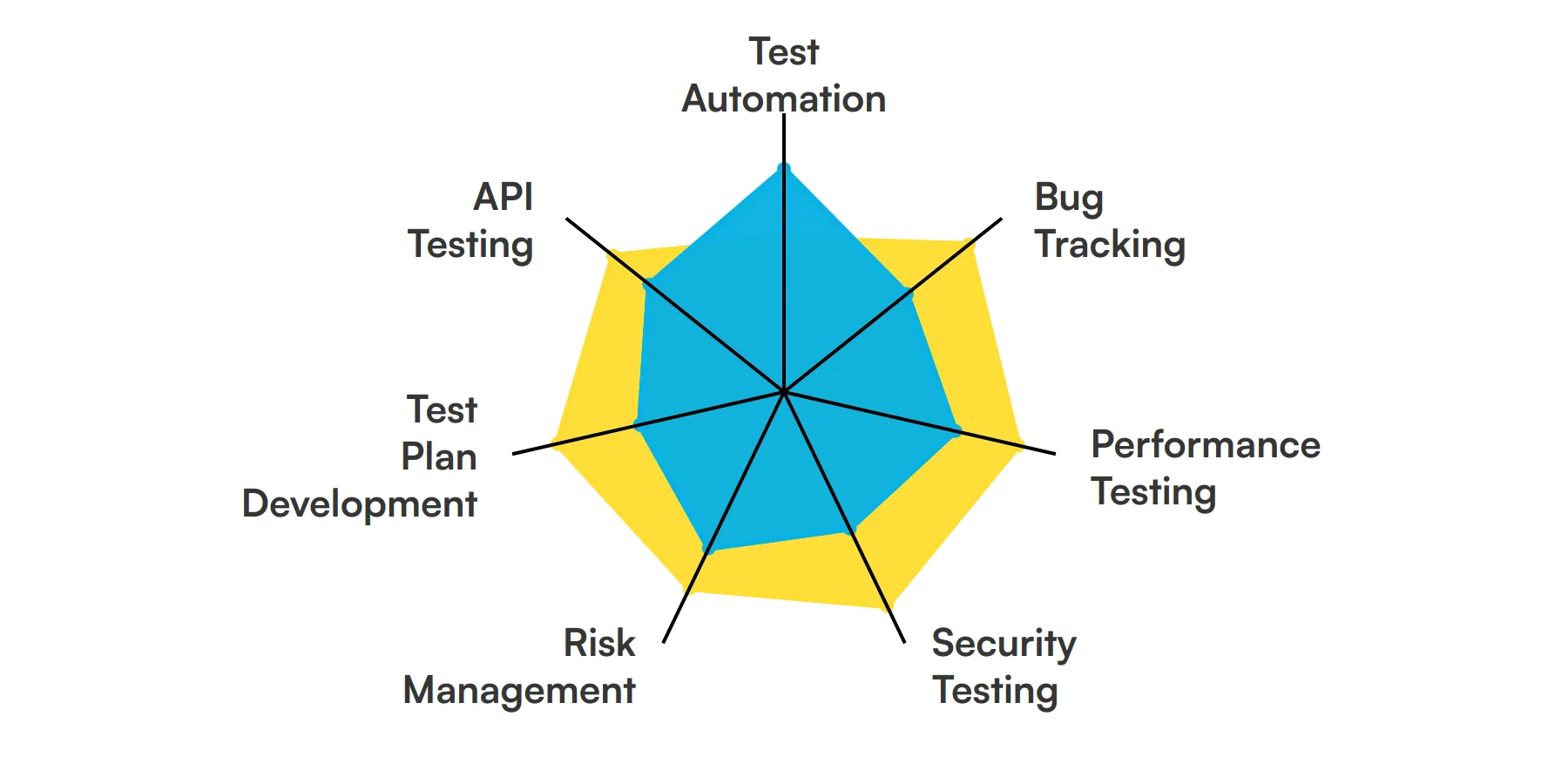
Test Automation
A QA Lead must be proficient in automating test processes to streamline testing phases and reduce manual effort. Automation skills help in setting up continuous integration and delivery pipelines, ensuring that new code submissions are automatically tested, which is crucial for agile development environments.
For more insights, check out our guide to writing a Quality Assurance (QA) Engineer Job Description.
Bug Tracking
Effective bug tracking and management are key for a QA Lead. This skill involves using tools to document, track, and prioritize bugs. A QA Lead uses this skill to facilitate clear communication between team members and to maintain the quality of the product by ensuring all issues are addressed before release.
Performance Testing
QA Leads need to ensure that the software performs well under expected workloads. Skills in performance testing involve understanding and creating tests that simulate varying levels of user traffic and data processing, which helps in identifying potential bottlenecks and performance issues.
Security Testing
Security testing is critical as it ensures that applications are free from vulnerabilities that could be exploited. A QA Lead uses this skill to oversee the development of secure applications by integrating security testing into the software development lifecycle.
Check out our guide for a comprehensive list of interview questions.
Risk Management
Risk management involves identifying, analyzing, and mitigating risks in the software development process. A QA Lead uses this skill to prioritize testing efforts based on potential impacts, ensuring that critical issues are resolved early in the development cycle.
Test Plan Development
Developing comprehensive test plans is a fundamental skill for a QA Lead. This involves outlining the testing strategy, resources, schedules, and deliverables. It ensures that the team adheres to a structured testing approach that aligns with project goals and timelines.
For more insights, check out our guide to writing a Software Tester Job Description.
API Testing
API testing is essential to ensure that different software systems communicate effectively. A QA Lead must be skilled in API testing to verify that all integrations and interfaces work as expected, which is crucial for the system's overall functionality.
8 secondary QA Lead skills and traits
The best skills for QA Leads include Agile Methodologies, Cross-Platform Testing, Communication, Documentation, User Experience Testing, Continuous Learning, Data Analysis and Team Collaboration.
Let’s dive into the details by examining the 8 secondary skills of a QA Lead.
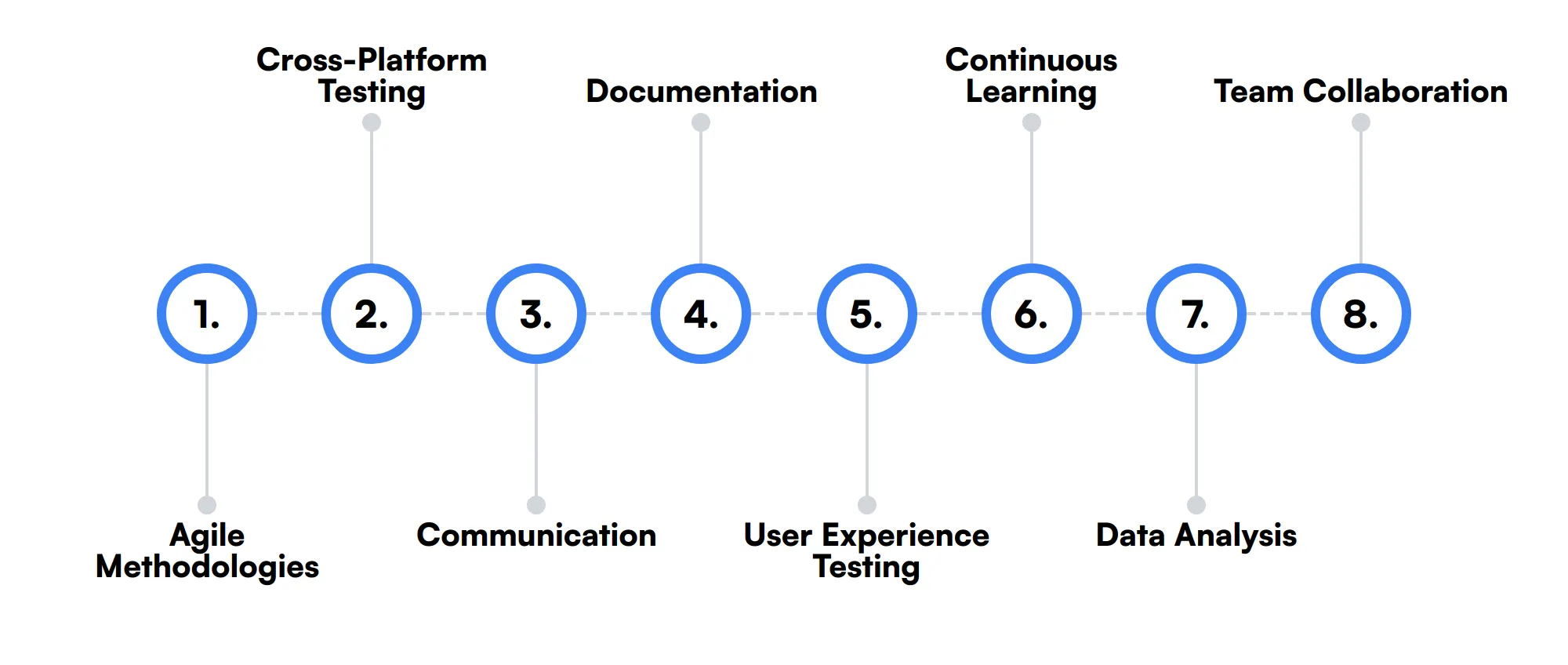
Agile Methodologies
Understanding Agile methodologies is beneficial for a QA Lead as it helps integrate quality assurance into the iterative development process, promoting faster releases and continuous improvement.
Cross-Platform Testing
Skills in cross-platform testing ensure that applications provide a consistent experience across various devices and operating systems, which is important for user satisfaction and accessibility.
Communication
Strong communication skills enable a QA Lead to effectively convey testing needs and results to team members and stakeholders, ensuring that everyone is aligned on the quality objectives.
Documentation
Proper documentation skills are necessary for maintaining clear and accessible records of test cases, results, and software anomalies, which supports effective troubleshooting and future testing cycles.
User Experience Testing
Understanding user experience helps a QA Lead ensure that the application is intuitive and meets user expectations, which is crucial for product success in the market.
Continuous Learning
The technology landscape is constantly evolving, and a QA Lead benefits from a commitment to continuous learning to keep up with new testing tools and methodologies.
Data Analysis
Data analysis skills help a QA Lead interpret test results and metrics to derive insights on software quality and performance, guiding further testing and development efforts.
Team Collaboration
A QA Lead often works closely with developers, product managers, and other stakeholders. Effective team collaboration ensures that the testing strategies are well integrated into the overall project.
How to assess QA Lead skills and traits
Assessing the skills and traits of a QA Lead can be a challenging task, given the diverse range of expertise required. From test automation to risk management, a QA Lead must possess a comprehensive skill set to ensure the quality and reliability of software products.
Traditional resumes and interviews often fall short in evaluating these competencies effectively. This is where skills-based assessments come into play. By leveraging tools like Adaface on-the-job skill tests, you can achieve a 2x improved quality of hires and an 85% reduction in screening time.
Whether it's bug tracking, performance testing, or API testing, a well-structured assessment can provide a clear picture of a candidate's abilities. These tests help you identify the right fit for your team, ensuring that your QA Lead can handle the complexities of modern software development.
Let’s look at how to assess QA Lead skills with these 6 talent assessments.
Selenium Online Test
Our Selenium Online Test evaluates a candidate's proficiency in using Selenium Webdriver for automation testing. This includes their ability to interact with live websites, perform cross-browser testing, and develop custom testing frameworks.
The test assesses their knowledge of Selenium architecture, API testing, and various framework designs such as Data-Driven and Hybrid frameworks.
Successful candidates demonstrate the ability to build and customize testing frameworks, perform database and performance testing, and generate detailed reports using Selenium.
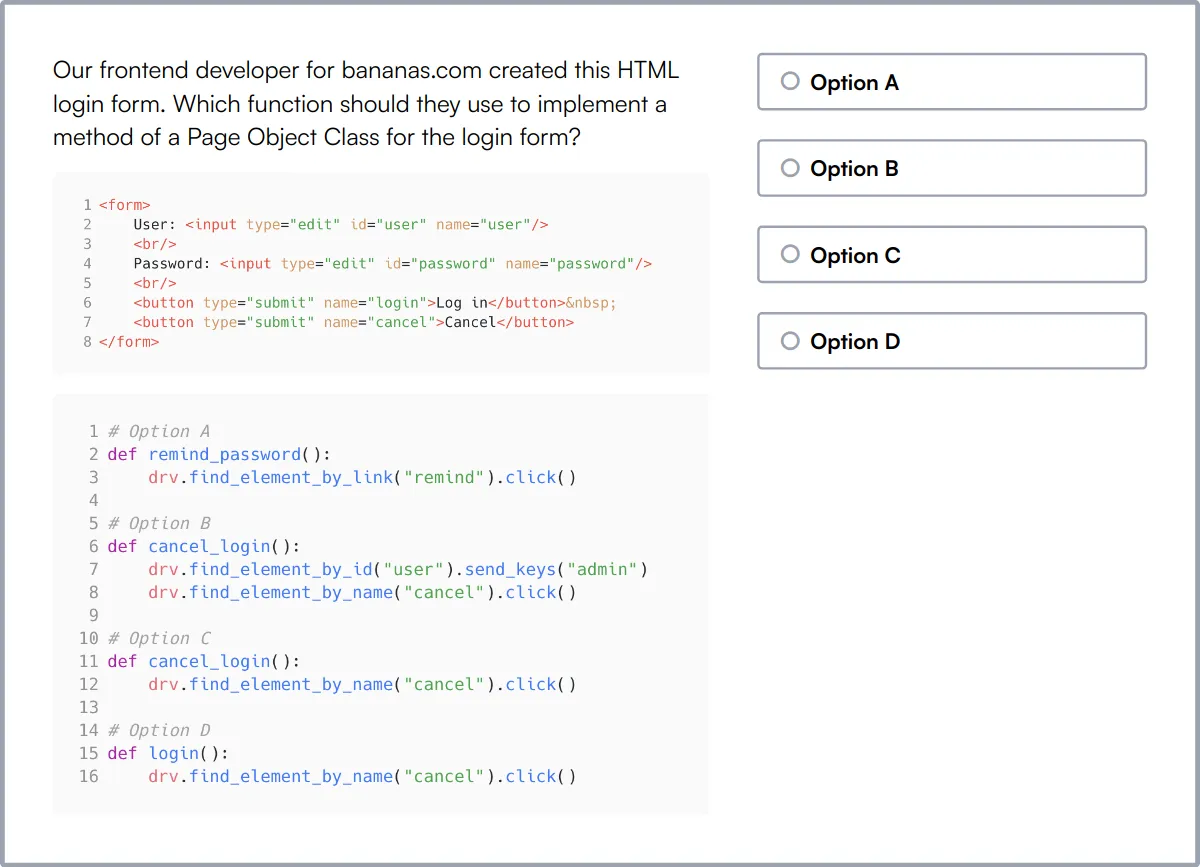
Jira Online Test
Our Jira Online Test measures a candidate's understanding of Jira Software Cloud, focusing on its application in Scrum and Kanban project management environments.
The test covers Scrum fundamentals, Agile boards, and the management of backlogs and sprints, as well as Jira administration.
Candidates who excel in this test show a strong grasp of Agile project management tools and techniques, essential for efficient sprint and backlog management.
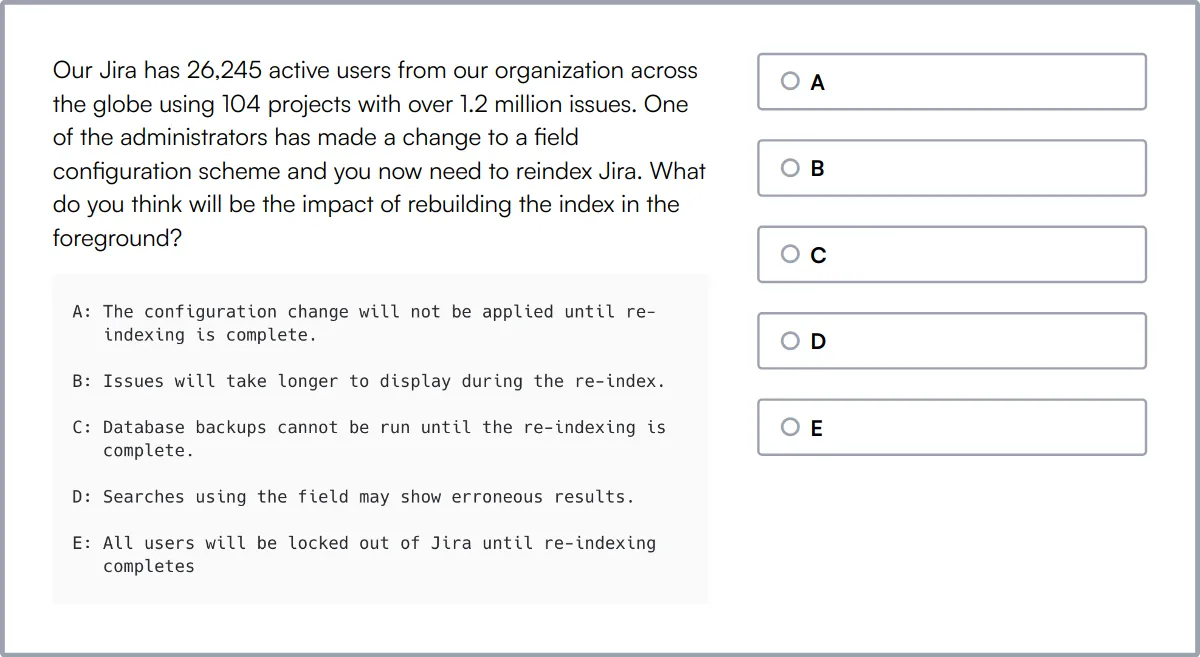
Web Testing
Our Web Testing assesses candidates on their ability to design and execute tests for web applications using both manual and automated testing tools like Selenium.
This test evaluates fundamental web testing skills, including test planning and the use of QA tools.
High-scoring candidates will demonstrate a thorough understanding of web testing principles and the ability to effectively use tools to identify and resolve defects.
Penetration Testing Test
Our Penetration Testing Test evaluates a candidate's expertise in network security, vulnerability assessment, and ethical hacking.
The test challenges candidates on their knowledge of penetration testing techniques and web application security.
Candidates proficient in this test can effectively identify and exploit vulnerabilities, contributing to the enhancement of system security.
Project Management Test
Our Project Management Test assesses a candidate's ability to manage and execute projects, covering everything from cost estimation to stakeholder management.
The test evaluates skills in designing project plans, managing resources, and handling changes and risks throughout the project lifecycle.
Effective candidates demonstrate the ability to lead projects successfully, ensuring timely delivery and alignment with business goals.
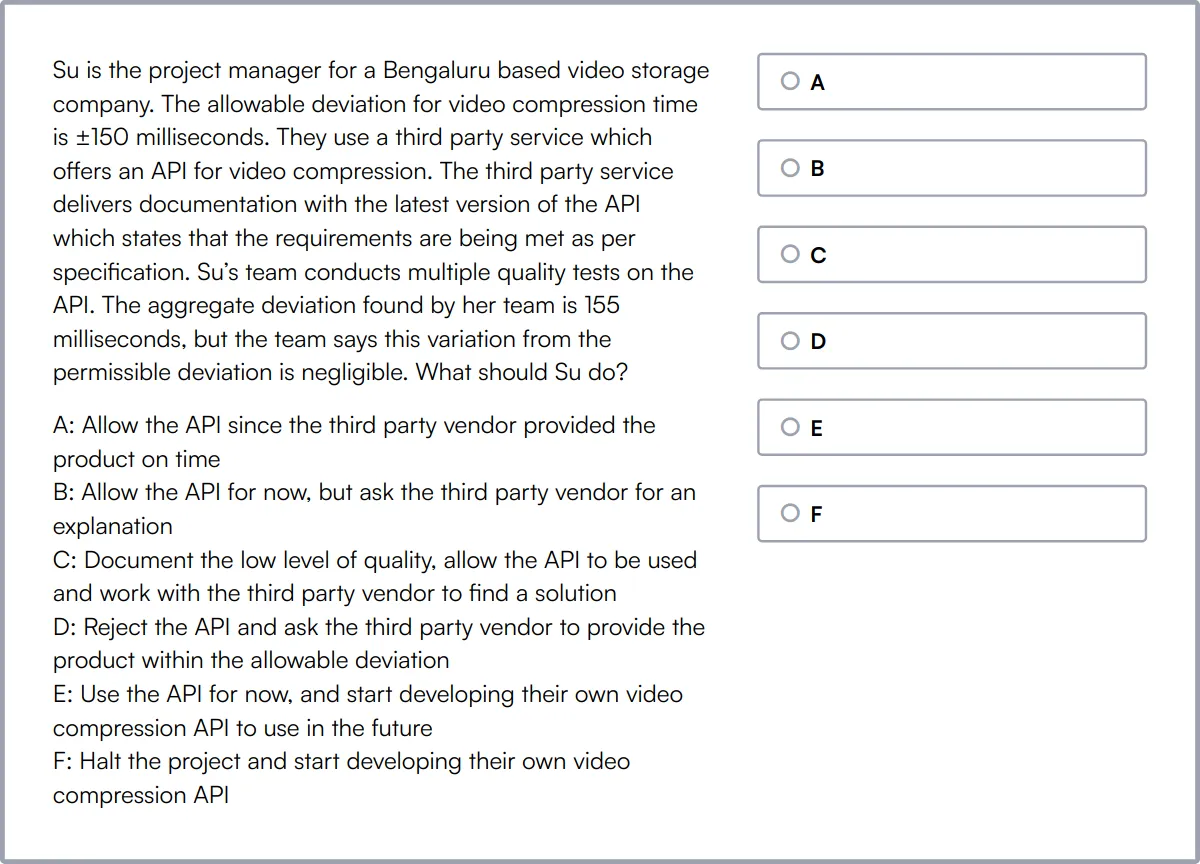
Quality Assurance Aptitude Test
Our Quality Assurance Aptitude Test gauges a candidate's aptitude in quality assurance, focusing on test planning, design, and defect tracking.
This test assesses analytical thinking, logical reasoning, and a comprehensive understanding of software testing and quality assurance methodologies.
Candidates who score well are proficient in creating detailed test plans, executing tests efficiently, and identifying and documenting defects effectively.
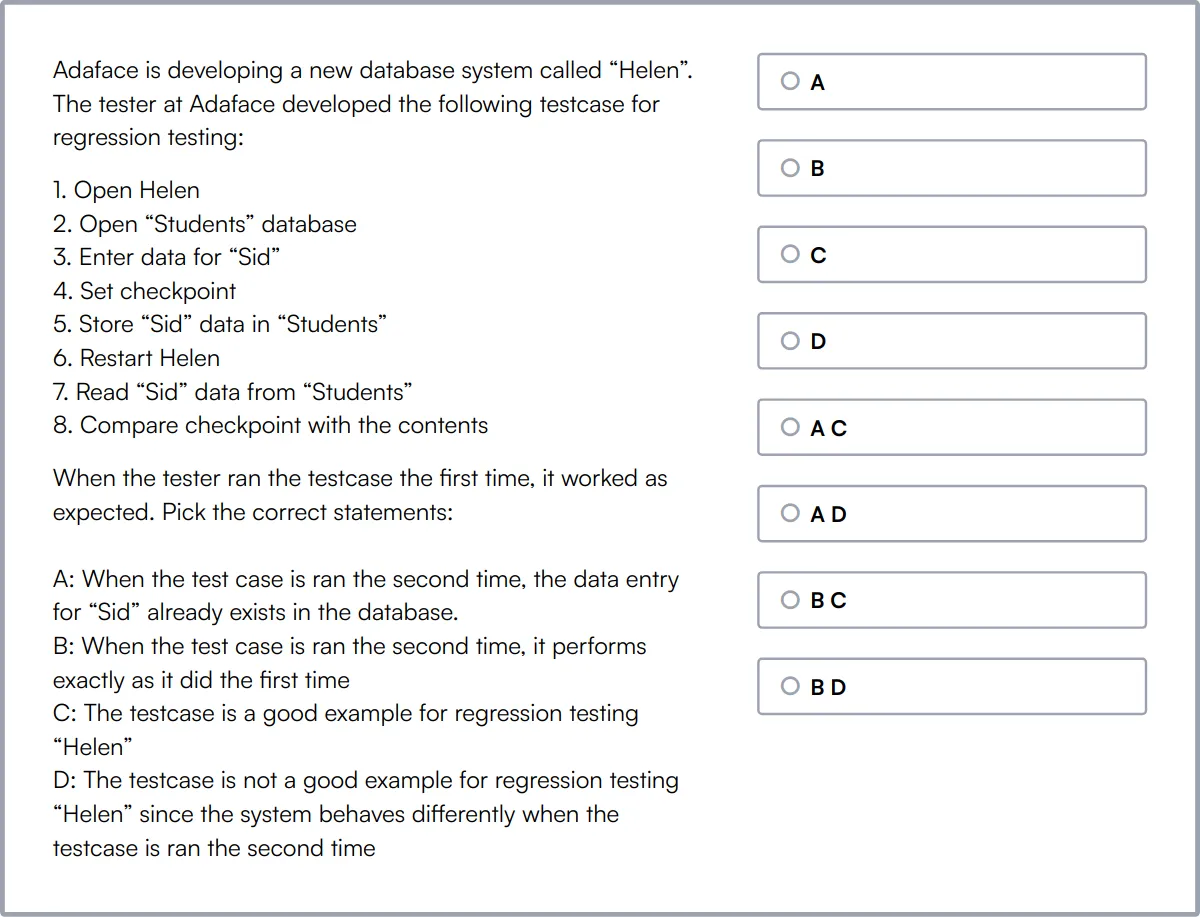
Summary: The 7 key QA Lead skills and how to test for them
| QA Lead skill | How to assess them |
|---|---|
| 1. Test Automation | Evaluate a candidate's ability to design and implement automated test scripts. |
| 2. Bug Tracking | Assess how effectively a candidate can identify, track, and manage bugs. |
| 3. Performance Testing | Check a candidate's skills in optimizing software speed, stability, and scalability. |
| 4. Security Testing | Determine a candidate's capability to identify and mitigate security vulnerabilities. |
| 5. Risk Management | Review how a candidate identifies, analyzes, and proposes mitigation for risks. |
| 6. Test Plan Development | Observe a candidate's approach to creating comprehensive, clear test plans. |
| 7. API Testing | Assess proficiency in testing APIs for functionality, reliability, and performance. |
QA Engineer Test
QA Lead skills FAQs
What is the importance of test automation in a QA Lead role?
Test automation helps QA Leads streamline repetitive testing tasks, ensuring faster and more reliable test cycles. It allows teams to focus on more complex testing scenarios.
How can recruiters assess a candidate's bug tracking skills?
Recruiters can ask candidates about their experience with bug tracking tools like JIRA or Bugzilla. They can also request examples of how they have managed and resolved bugs in past projects.
Why is performance testing critical for a QA Lead?
Performance testing ensures that applications run smoothly under various conditions. QA Leads use it to identify bottlenecks and optimize system performance.
What should recruiters look for in a candidate's security testing skills?
Recruiters should look for experience with security testing tools and methodologies. Candidates should be able to discuss how they identify and mitigate security vulnerabilities.
How does risk management play a role in QA Lead responsibilities?
Risk management involves identifying potential issues that could impact the project. QA Leads use it to prioritize testing efforts and allocate resources effectively.
What makes a good test plan, and how can it be assessed?
A good test plan is comprehensive, clear, and well-structured. Recruiters can ask candidates to provide examples of test plans they have developed and discuss their approach.
How important is API testing for a QA Lead?
API testing ensures that different software components interact correctly. QA Leads use it to verify the functionality, reliability, and security of APIs.
What role does communication play in a QA Lead's job?
Effective communication is key for QA Leads to coordinate with development teams, stakeholders, and other QA members. It ensures that everyone is aligned on project goals and issues.

40 min skill tests.
No trick questions.
Accurate shortlisting.
We make it easy for you to find the best candidates in your pipeline with a 40 min skills test.
Try for freeRelated posts
Free resources



